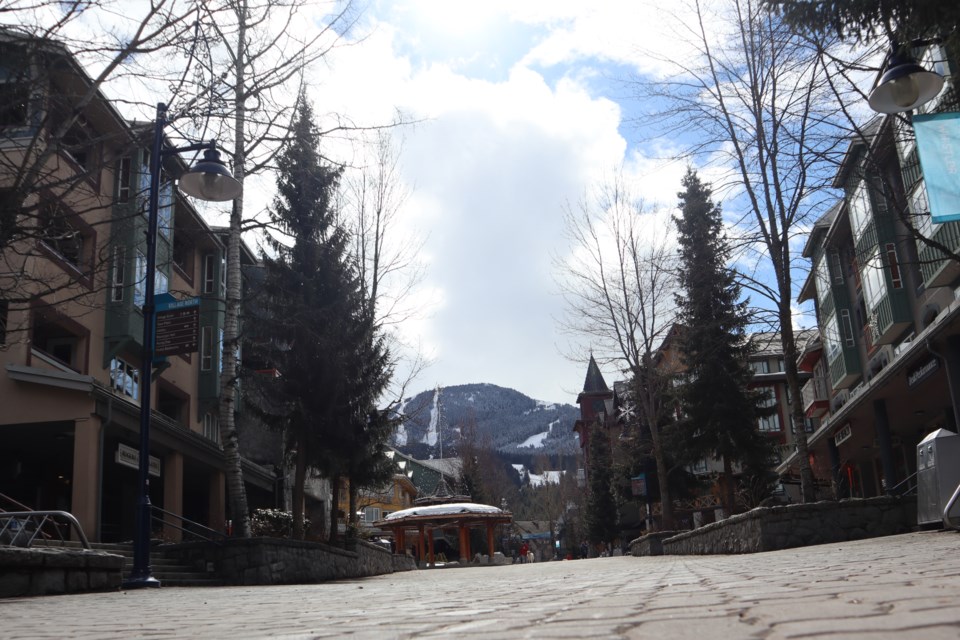There’s a pleasant sort of disorientation one experiences when walking Whistler’s Village Stroll for the first time.
According to American architect Eldon Beck, who designed the Village Stroll in the late 1970s, that disorientation is a feature rather than a flaw.
With its meandering flow and absence of right angles, the design was meant to encourage “variety, intrigue and excitement,” while also promoting “exploration” and “surprise,” Beck said in a presentation in Whistler years ago.
The design was inspired by a stream in the town of Vail, beside which the architect used to rest after difficult meetings while working as a consultant.
Nearly eight years after I first encountered it, I’m still in awe of the elegance of Beck’s design, and how well it achieves his original vision.
I’ll never forget my first walk down the Village Stroll, and how overwhelming it all felt—the animation and the energy, the diverging paths, and just the sheer unknown of it all.
That sense of mystery and impending excitement is just one of the major factors that have kept me here all these years later.
I spent much of my first year in the resort wandering and exploring, marvelling at features both manmade and natural, and getting swept up in a seemingly endless parade of festivals and pedestrian traffic.
A celebration of yoga highlighted by hundreds stretching in unison on the lawn at Whistler Olympic Plaza one weekend; clusters of uproarious and jovial 20-somethings wearing matching Tough Mudder headbands roaming this way and that the next.
Race announcers bellowing into megaphones; sharply dressed conference-goers with their dead-giveaway lanyards; a pop-up stage with a collection of bands; a half-dozen visible bachelorette parties on any given weekend.
Remember how much fun our little town used to be? Remember how alive everything used to feel?
I don’t want to jinx anything. I know the pandemic isn’t over, and another new variant is always potentially just around the corner.
But with the provincial announcement on Feb. 15 that COVID-19 restrictions are finally being rolled back, it feels like an immense weight has just lifted off Whistler’s collective shoulders.
No free tables? No worries! Come on in and mingle by the bar.
Remember dancing? The cage at Buffalo Bills is calling your name.
Festivals, events and conferences? Slowly but surely, they’re coming back.
According to the Resort Municipality of Whistler, planning is underway for 2022 Festivals Events and Animation programming (keeping Provincial Health Officer developments front of mind, of course).
“In general, the team is realistically optimistic in terms of their approach to planning festivals and events during this pandemic,” a municipal spokesperson said, adding that a small handful of third-party events have made announcements as of late, including the Whistler Half Marathon, the Back Forty Marathon, XFONDO, the Whistler Off Road Triathlon, Run Comfy Numb, RBC GranFondo Whistler and Crankworx.
The World Ski and Snowboard Festival won’t run this year after going digital in 2021, but plans are in motion for a grand return in 2023.
At Tourism Whistler (TW), some recent changes in government policy are instilling confidence: a switch from a PCR testing requirement to rapid antigen or PCR, the lifting of mandatory arrival testing and the removal of potential quarantine requirements chief among them.
Meanwhile, a two-year commitment of $9.3 million from the provincial government to support B.C.’s business events and conferences industry is also welcome news.
The funding will help organizations like TW “to increase investments into attracting multi-day conference groups, from U.S. and international markets primarily, but also from Canadian markets,” said TW’s president and CEO Barrett Fisher, in an email.
A surge of Omicron cases in January led to about a dozen conference cancellations in Whistler, but with COVID-19 now receding, “there is greater interest and optimism by meeting planners, and our remaining conference groups for the rest of the year (which is a strong volume, many of which were re-booked from 2020 and 2021) are proceeding,” Fisher added.
With its high seasons typically coming in the spring, early summer and fall periods, meeting and conference business serves as a nice complement to Whistler’s summer and winter visitation peaks—so it’s important that we keep that ball rolling.
“Conference business is also weather-independent, and is booked further in advance than leisure business, providing greater certainty for businesses to plan staffing around,” Fisher said.
“While we do have some business on the books for 2023, 2024, 2025 and beyond, we still have our work cut out for us in growing conference business in future years to achieve levels seen in more buoyant pre-COVID years.”
The return to something resembling normalcy will undoubtedly make some people nervous—and it can’t be a drop-everything mentality.
It doesn’t mean doing away with COVID-19 protections overnight, or pretending the virus no longer exists.
While a mask mandate remains in place in B.C., we’re already seeing videos of dozens of unmasked bar patrons dancing and mingling, in Whistler and beyond, which health professionals say will inevitably lead to more cases—and which we know from experience doesn’t bode well for the long-term reanimation of Whistler.
Or maybe our health officials are content with where we are in the fight against COVID-19, and see the risks attached with another shutdown as outweighing the reward?
Listening to Provincial Health Officer Dr. Bonnie Henry last week, that does seem to be the new mentality—in lifting restrictions on Feb. 15, Henry noted that people will need to “manage their own risk in most settings” as we open back up.
Weighing the uncertainty of the past two years, I’m not going to make any bold predictions about the pandemic for 2022. It’s still an incredibly touchy subject for many, and everyone will have their own take on the best path forward.
But wherever you stand, reanimating Whistler is crucial to the long-term vitality of the resort, both from an economic and community well-being perspective.




